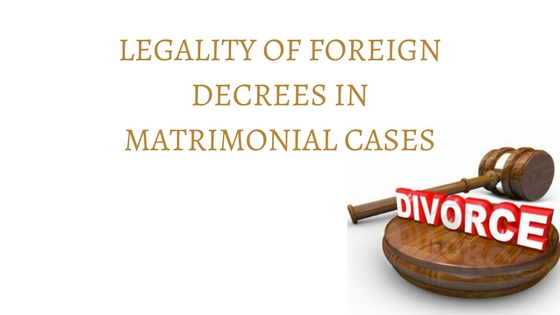Aapka Consultant Judgment Series- In this series, we are providing case analysis of Landmark Judgments of Hon’ble Supreme Court of India.
Y. Narasimha Rao and Ors v. Y. Venkata Lakshmi and Anr.
1991 SCR [2] 821, [1991] 3 SCC 451JUDGES: Rangnath Misra and P.B. Sawant
Date of Decision: 09-07-1991
FACTS:-
In this case, appellant (Narasimha) married to respondent (Venkata) in Tirupati, India as per Hindu law in 1975. The couple last resided together in New Orleans and then appellant moved to USA. Later, in 1978, appellant filed a petition for dissolution of marriage in the Missouri, USA and obtained the decree for irrevocable breakdown of marriage by technically satisfying the requirement of residence of 90 days in the State of Missouri, USA. The wife had clearly stated that she did not submit to the jurisdiction of the Missouri Court. Appellant married other women and hence, respondent filed a criminal complaint against the appellant for bigamy. The learned Magistrate discharged the appellant in view of the decree for dissolution of marriage passed by foreign court. But High Court in appeal, reversed the order on the ground that Photostat copy of the decree is not admissible in evidence and thereof, resultantly, appellant filed an application before the Hon’ble Supreme Court for discharge against the order of the High Court.
ISSUE:-
Whether the foreign divorce decrees can be enforced under S. 13 of Code, 1908 by the courts in this country?
JUDGMENT:-
The plain reading of S.13 of the CPC explains that a foreign court is not conclusive as to any matter thereby directly adjudicated upon between the parties if (a) it has not been pronounced by a court of competent jurisdiction; (b) it has not been given on the merits of the case; (c) it is founded on an incorrect view of international law or a refusal to recognize the law of India in cases in which such law is applicable; (d) the proceedings are opposed to natural justice, (e) it is obtained by fraud, (f) it sustains a claim founded on a breach of any law in force in India. Further, the Hindu Marriage Act, 1955, constitutes only the District Court within the local limits of whose original civil jurisdiction (i) the marriage was solemnized, or (ii) the respondent, at the time of the presentation of the petition resides, or (iii) the parties to the marriage last resided together, or (iv) the petitioner is residing at the time of the presentation of the petition, in a case where the respondent is, at the time, residing outside the territories to which the Act extends. Thereby, taking note of the above provision, Hon’ble Court found the present decree passed by the foreign court was without jurisdiction according to the Act as neither the marriage was celebrated nor the parties last resided together nor the respondent resided within the jurisdiction of that Court. Also, irretrievable breakdown of marriage is not one of the grounds recognised by the Act for dissolution of marriage.
While deciding the case, the Hon’ble Court laid down the law for foreign matrimonial judgments in this country.
The key rule laid by the Hon’ble Court could be summed up as follows:
If a couple is married as per the Hindu law, then –
- The foreign court that grants divorce must be acceptable under Hindu law; and
- The foreign court should grant divorce only on the grounds which are permissible under the Hindu Law.
The jurisdiction assumed by the foreign court as well as the grounds on which the relief is granted must be in accordance with the matrimonial law under which the parties are married. But the Court also laid exceptions to the above in a case where husband has filed for divorce in a foreign land:
- The wife must be domiciled and resident of that foreign land and the foreign court should decide the case based on the Hindu Law;
- The wife voluntarily attends and contests the claims in the court proceedings as per Hindu Law;
- The wife consents to grant the divorce.
In the context of the observation and rules, Hon’ble Court pointed out the error made in giving reasoning by the High court and upheld that the document is not admissible in evidence for want of the certificate under Section 86 of the Evidence Act i.e. copies should be certified by Central Government in the United States.
Thus, relying on above rules, Hon’ble Court dismissed the application on the ground that the jurisdiction of the forum as well as the ground on which the divorce decree was passed is not in accordance with the Hindu Law under which the parties were married, and the respondent had not submitted to the jurisdiction of the court or consented to its passing, it cannot be recognized by the courts in this country and was hence held unenforceable.
HELD:-
It was held that “irretrievable breakdown of marriage” is not recognized under the Hindu Marriage Act and hence divorce granted by a foreign court on this ground cannot be held valid.
To Get Legal Opinion from Advocates/ Legal Experts, Please click here
To Get Legal Opinion from Retired Hon’ble Judges, Please click here












